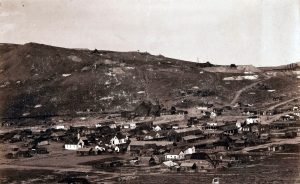As you are coming to the end of your long journey, you’re overwhelmed with the idea that you’ll be home soon, accompanied by warm, familiar faces. However, when you return home, you’re not welcomed by friends and family, but by silence and only the howl of the wind. You look around and not a single soul is in sight. Not one person in your home or in your whole village. A frightening scenario, isn’t it? This was the startling reality that John White and his fellow colonists were faced with when they returned home from their long voyage. His home was none other than the infamous Roanoke Colony.

In 1587, John White led 113 men, women, and children to Roanoke island on behalf of Queen Elizabeth I, in order to establish a New World colony, and claim riches for the queen and people of England.1 The land was somewhat familiar as it had been a previous military outpost.2 However, its first attempt at establishing a colony there had failed. John White and his men were determined not to fail their Queen on this attempt. They especially did not want to fail their investor, Sir Walter Raleigh, like others had in the past. So they went to all extents to make sure their colony’s needs were met.3 The colony seemed to settle well; however, they quickly outgrew supplies, which were essential for the long-term establishment of the colony; so now governor of Roanoke, John White, sailed back to England in order to restock. Upon his arrival in London, he was met with war with Spain and the Spanish Armada, England’s enemy at the time. Storms and many other factors made the return back to Roanoke a long one, one of years, leaving the colonists to wonder when their leader would return.4
Once John White and his men returned, Roanoke was bereft of all its colonists. They recalled that on their way to Roanoke, once already on land, they found a few footprints from Indians.5 However, they made nothing of it at the time. When they reached the village, White came across the letters “CRO” carved on a tree and the word “CROATOAN” carved on a post. Upon further inspection, it seemed that all the houses that the Roanoke Colonist were living in had been dismantled. After seeing this, White was more at ease because he believed that they had relocated to Croatoan, where the Croatoan tribe lived. This was due to the fact that White told the colonists that if they ever relocated, they were to carve the name of their new location somewhere visible. If the move or escape was out of distress, they were also to carve a Maltese cross, but none were in sight. One small thing bothered White though. He had told the colonists to hide his valuables underground, but he found that some were scattered and others were lost. In the end, for a reason unknown, White only looked for the colony one time, but didn’t find them. After this failed attempt, he made no others.6
One question still lingered in the mind of many others: what happened to the Roanoke colonists? It’s said that they were never seen again by Europeans, but there were also many speculated accounts of their whereabouts and fate. In 1608, John Smith wrote in his book that the Indians reported to him of people that looked like him. George Percy, another colonist, reported seeing a white boy with blonde hair among the Indians. Smith later sent two missions towards the south in order to find evidence of the remaining colonists, eventually learning that they were killed.7

Later, a twenty-one-quartz stone was discovered that is believed to have been a “grave marker” for the Roanoke deceased. On the smooth side of the stone was a cross and on the other were passages, speaking of deaths within the colony along with the years.8 As a last matter, in 1612, writer William Strachey reported that the Roanoke Colony did indeed live in harmony with the Chesapeake Indians for twenty-five years. Both the Indians and colonists shared knowledge and lived together until Powhatan, a leader of another Indian tribe called the Powhatan, slaughtered the colonists and the Indians sheltering them in fear that a rival to him would appear from within their tribe. A few of the colonists escaped and were later spared when they were found due to the fact that they worked well with copper, making them valuable. Still many wondered if these were facts or just stories that people wanted to hear.9 In the end, all the evidence points to the fact that the Roanoke colonists are not lost to history, but were rather killed off by brutal Indians. There is no mystery left, it’s just a matter of connecting the dots.
- The Gale Encyclopedia of the Unusual and Unexplained, 2003, s.v. “The Desertion of Roanoke,” by Brad Steiger and Sherry Hanson Steiger; Karenne Wood, “The Roanoke Colony,” South Atlantic Review 77, no. 1/2 (2012): 178-79. ↵
- Lee Miller, Roanoke Solving the Mystery of England’s Lost Colony (London: Pimlico, 2001), 7-9. ↵
- Karenne Wood, “The Roanoke Colony,” South Atlantic Review 77, no. 1/2 (2012): 178-79. ↵
- Lee Miller, Roanoke Solving the Mystery of England’s Lost Colony (London: Pimlico, 2001), 10-11. ↵
- Karen Odahl Kupperman, Roanoke The Abandoned Colony (New Jersey: Rowman & Allanheld, 1984), 133-135. ↵
- Karen Odahl Kupperman, Roanoke The Abandoned Colony (New Jersey: Rowman & Allanheld, 1984), 136-137. ↵
- Karen Odahl Kupperman, Roanoke The Abandoned Colony (New Jersey: Rowman & Allanheld, 1984), 137-139. ↵
- Haywood J. Pearce, “New Light on the Roanoke Colony: A Preliminary Examination of a Stone Found in Chowan County, North Carolina,” The Journal of Southern History 4, no. 2 (1938): 148-150. ↵
- Karen Odahl Kupperman, Roanoke The Abandoned Colony (New Jersey: Rowman & Allanheld, 1984), 139. ↵



114 comments
Reagan Clark
This article is fascinating! I have heard the story of Roanoke multiple times but have never heard this side of it! The fact that the colonists might have been living with the natives is astonishing. I have head about the word “Croatoan” but was told that it was a satanic word that was a sign of the apocalypses. This article provided a lot of insight into the possibilities of what might have happened.
Melissa Garza
I really enjoy this article! I think a lot of people love to just wonder the different scenarios that could’ve taken place. I absolutely love conspiracies but in this particular case I didn’t know much information about the whereabouts of the colony. It’s crazy to think that a whole colony was just brutally killed and I can’t help but wonder if they were taken there forcefully or if they simply went with the tribe for assistance.
Leopoldo Martinez-Milland
The opening paragraph by Ezequiel De La Fuente was a haunting one, to say the least, and definitely set the tone for what was in store with this article. The mystery behind Roanoake County is something I have minimal knowledge of, so this was a great and informative read for me. Though it is interesting to go deep into the conspiracy, I think that it is safe to say that the colonists of Roanoake were unfortunately murdered by Native Americans.
Arturo Canchola
This is a story that many, regardless of their relationship with their history classes, still remember to this day. This article’s title and exposition was both gripping and exciting to me. I think it is in part due to the intrigue: How does an entire colony just go missing? I like that the article went in-depth as to what the remnants of the colony when they went missing, while leaving it open for the reader to make their own conclusions surrounding the mystery of the lost colony.
Roberto Rodriguez
This is a classic story, I never really liked history class or remembering things for history class, but I do remember this story. Ironically enough, I think that it might be the mystery that makes the story so memorable. It is just really interesting how an entire group of people can just vanish without any trace. I would love to see a documentary on what is the accepted theory as to why and how Roanoke disappeared. Great article!
Sydney Hardeman
This was a suspenseful article which I liked. I remember learning about Roanoke in history in high school but never actually learned about it because it is unclear of what exactly happened to the colony, so there wasn’t much to say and we just moved on to Jamestown. the first “permanent” English settlement. This was an interesting article to read and kept me intrigued because I have been wondering what happened to Roanoke since learning about it.
John Estrada
A classic tale of the whole town that went missing. There are movies and shows (AHS) based simply on this terrifying real world event from history. I never gave mind or went into details on what could have possibly happened, so I’m relieved that this article never really tries to tell us what happened. Rather the article explains to us what the aftermath and leaves it to us to still interpret what happened to the town. Last note, your article had an amazing opening paragraph, definitely attention grabbing that remained throughout; perfect use of eeriness and intensity.
Kenneth Gilley
What an interesting article! It seems that the fate of the Roanoke Colony was a great mystery for quite some time. However, the author does a good job connecting the dots and giving us a likely conclusion concerning their fate. The colonists wound up being slaughtered by American Indians. This article does a great job of drawing in and holding the attention of the reader.
Jake Mares
I remember hearing about this mystery in middle school, and it has intrigued me ever since. Whatever the colonists endured, this will always be shrouded in mystery. It seems very hard to just disappear off the earth with little to no trace of anything remaining where you once lived. The natives’ slaughter of the colonists shows how lucky White was in leaving his colony.
Juan Arceo
This article clearly represented that mysterious feeling that the colonists must have felt when not just arriving at Roanoke but that same feeling that we feel when we hear about how it disappeared. I have always been fascinated with this story since the first time that I heard and this article just left me more confused. The fact that the main theory is that the Indian killed off the most of the colonists isn’t as crazy as it seems, but I still can’t wrap my head around the mystery of the Roanoke colony.